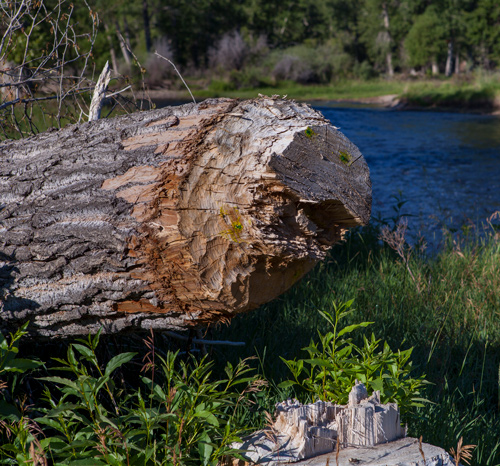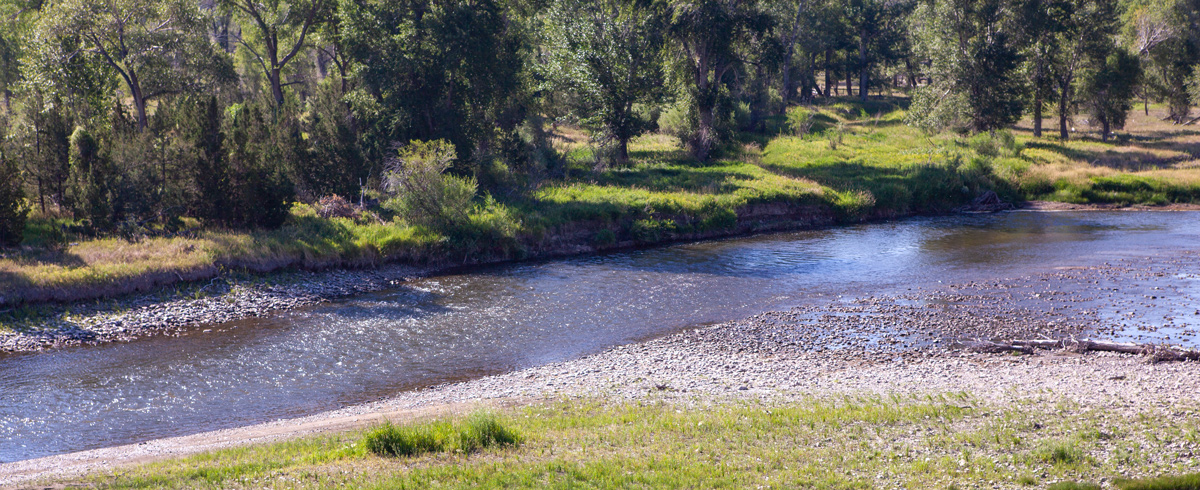Forks of the Jefferson, MT Clark notes how hard the men must work to move the canoes up the shallow and swift Jefferson River. Ahead, Lewis ponders the many rivers, and chooses the Beaverhead River.
Beaver-fallen Tree
Big Hole River, © 22 July 2013, by Kristopher K. Townsend. Permission to use granted under the Creative Commons Attribution-Share Alike 4.0 International license.
Many Rivers to Ponder[1]Originally aired weekdays by Yellowstone Public Radio during the Bicentennial observance of 2003-2006. Narrated by Hal Hansen. Scripts by Whit Hansen and Ed Jacobson. Produced by Leni Holliman. © … Continue reading
Lewis: Many Rivers
Choosing the Middle Fork
[The middle fork’s] course so far as I can observe it is about S. W., and from the opening of the valley I beleive it still bears more to the West above it may be safely navigated. it’s water is much warmer then the rapid fork and it’s water more turbid; from which I conjecture that it has it’s sources at a greater distance in the mountains and passes through an opener country than the other.
—Meriwether Lewis
A Note for Clark
under this impression I wrote a note to Capt Clark, recommending his taking the middle fork povided he should arrive at this place before my return, which I expect will be the day after tomorrow. this note I left on a pole at the forks of the river
—Meriwether Lewis
Exploring the Big Hole
we continued our rout up the rapid fork on the Stard side, resolving to pursue this stream untill noon tomorrow and then pass over to the middle fork and come down it to their junction or untill I meet Capt Clark. I have seen no recent Indian sign in the course of my rout as yet.
—Meriwether Lewis
Charbonneau Struggles
Charbono [Charbonneau] complains much of his leg, and is the cause of considerable detention to us.
—Meriwether Lewis
Clark: Struggling up the Jefferson
Jefferson River near Silverstar, Montana
© 22 July 2013 by Kristopher K. Townsend. Permission to use granted under the Creative Commons Attribution-Share Alike 4.0 International license.
Yesterday’s Note
a fine morning cool proceeded on verry early and Brackfast at the Camp Capt Lewis left yesterday morning, at this Camp he left a note informing that he discovered no fresh Sign of Indians &c. The river continued to be crouded with Islands Sholey rapid & clear, I could not walk on Shore to day as my ankle was Sore from a tumer on that part.
—William Clark
Extreme Labor and Fatigue
the method we are compelled to take to get on is fatigueing & laborious in the extreen, haul the Canoes over the rapids, which Suckceed each other every two or three hundred yards and between the water rapid oblige to towe & walke on Stones the whole day except when we have poleing men wet all day Sore feet
—William Clark
Weather Diary
State of the Thermometer at rise
Weather at rise
Wind at rise
State of the Thermometer at 4 P.M. Weather at 4 P.M. Wind at 4 P.M. State of the River 48 [above 0] fair S 92 [above 0] fair S fallen ½ in. —Meriwether Lewis[2]To assist the reader, the editor of this web page has omitted the date column, merged the “State of the river” columns, and spelled out some abbreviations.
Notes
| ↑1 | Originally aired weekdays by Yellowstone Public Radio during the Bicentennial observance of 2003-2006. Narrated by Hal Hansen. Scripts by Whit Hansen and Ed Jacobson. Produced by Leni Holliman. © 2003 by Yellowstone Public Radio. |
|---|---|
| ↑2 | To assist the reader, the editor of this web page has omitted the date column, merged the “State of the river” columns, and spelled out some abbreviations. |


